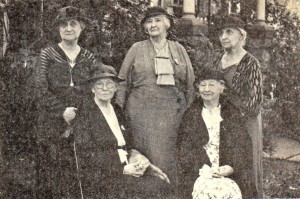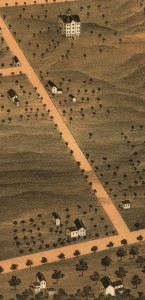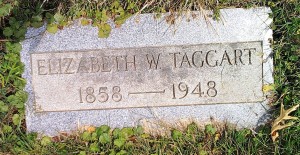
Elizabeth Wallace Taggart was the daughter of MC’s first president and a member of the college’s Alpha chapter of Kappa Kappa Gamma when secret societies were banned at Monmouth. She is pictured here (center), surrounded by four other early Kappas, during the reinstatement ceremony of the chapter held on campus in 1934. Not long after that, she recalled her early life in Monmouth in an interview.
Elizabeth Wallace Taggart, Class of 1880, was a member of a fascinating family. One of her brothers was the chief engineer in charge of constructing the Panama Canal. Another brother awarded the first military contract for an airplane to the Wright Brothers. Another brother was president of Norfolk College. Oh, and her father was the first president of Monmouth College.
Elizabeth, or Lizzie, as she was commonly called, grew up in the family home (destroyed by fire in 1873) directly across the street from what is now known as the Minnie Stewart House, where Kappa Kappa Gamma fraternity was founded in 1870. Lizzie was only 12 years old at the time, but I can imagine that having had Minnie Stewart as a neighbor had some influence on her decision to become a Kappa herself.
It was during her time as a student at Monmouth that fraternities were banned. She quietly remained an advocate for fraternities, however, (as did her father, who had been a fraternity man at Miami University), and returned to Monmouth in 1934 for the reinstatement of Kappa’s Alpha chapter.
After graduation, Lizzie taught for a year at the female seminary in Steubenville, Ohio. She married attorney Frank Taggart in 1883, bearing him four sons and two daughters. They made their home in Wooster, Ohio, where she died in 1948 and is buried.
One of Lizzie’s sons, David Alexander Taggart, had a son James, who is a retired attorney still living in Wooster. In 2011, James Taggart and his family were special guests of Monmouth College during Golden Scots Weekend, and donated to the college archives some family treasures associated with his great-grandfather David Wallace, including a Bible, a walking stick presented by the students of Monmouth College, and a posthumous oil portrait.
Mr. Taggart also provided the following invaluable account of his grandmother’s early life in Monmouth as the daughter of the Monmouth College president. Specific details concerning just when the “interview” was conducted or who conducted it have apparently been lost, but it was clearly the work of one of her grandchildren during the 1940s. It’s a fascinating first-person recollection that shines new light on the primitive conditions and hardships surrounding the early days of Monmouth College.
GRANDMOTHER TAGGART
There she sat in her comfortable apartment, eyes alight as she recounted incident after incident of her life and gave personality sketches of various members of the family. After more than 80 years of wear and tear, she is still a vivid person. Unmindful of her children’s suggestions as to help, she lives happily alone doing her own work, maintaining an active membership in the D.A.R. and her church, is keenly alive to the issues of the present day living. By recording her story, it is hoped to catch and preserve some of the flavor of her personality which seems to have come down through a long line of ancestors.
Her own memories begin when her father was president of a small college which he had founded.
“Tell me, grandmother,” I began, “How did college presidents and their families live in those early days when you were a little girl?”
“It wasn’t much like this,” mused grandmother, as she looked about the room where we sat in comfortable chairs with carefully placed reading lamps, thick floor coverings, and walls adorned with beautiful pictures.

Lizzie’s childhood home, pictured at lower right, burned in 1873, destroying most of her father’s papers. Just across the street is the home of Minnie Stewart, where Kappa Kappa Gamma was founded, while Monmouth College’s Old Main is at the top of the frame.
“Our living room,” she continued, “had a well-worn rag carpet and plenty of straight, strong chairs and was heated with a wood stove that even in the coldest weather was equal to its task. In the center of the room, the reading table held the books that the family were using and a weekly paper which not many families could afford. The walls were always clean as they were freshly whitewashed whenever mother’s housewifely instincts demanded it.
The blank whiteness was broken by chrome and an occasional picture. An oil lamp lighted the room and it was my duty to wash the chimney every morning. Mother often would tell me several times before I could remember to do it. I could not reach the middle from either end and there was that streak left which mother was firm about.
The other rooms of the house were not so well furnished and except for the kitchen there was no heat. On cold winter nights it did not take us long to get into bed. Mother saw to it that we had long heavy woolen gowns that buttoned well up about our throats. I can imagine her disapproval of modern styles in night clothes.
On very cold nights mother would heat bricks on the top of the living room stove. These wrapped in an old weekly were placed in our beds.
Along with her practicality mother had a sense of humor. She often told of the new hired girl who was troubled with cold feet at night. Mother suggested that she take a flat iron to bed with her. In the morning, when asked how she got along with it, replied that she had gotten it nearly warmed up by morning.
“Tell us grandmother,” I prompted, “what you did as a little girl.”
“Well,” replied grandmother, “we were busy all the time and the days were all too short. There was the catechism to learn and our school lessons to get. Then mother gave us training every day in the arts of housekeeping. We prepared vegetables for meals, scrubbed the floors sometimes, brought in the milk from the cool spring house, helped with candle making, and in the proper seasons helped to get the fruit for preserves and for drying.
“Then too we were trained to do skilled needlework and to knit. Our stockings were knitted by hand, with different colored yarns. We thought them very pretty but of course the public could not enjoy them as our long skirts came to our shoe tops. I was somewhat spoiled as my grandmother usually came in and turned the heels for me.
“If we wanted small rugs for our room we sewed the rags and wound them in balls for the weaver. Mother encouraged us to select the colors of the wrap that we liked best and it was great fun and a matter of pride to see whose rug would be the prettiest.”
“But Grandmother,” I said, “didn’t you play games and have fun like children do now?”
“Oh! Yes indeed we did. There was Libbie Hamsher living near, who was so skilled with a pen that she wrote all the commencement invitations and diplomas. She could draw all sorts of paper dolls, too, and would spend hours making them for us to cut out. To pay her for this, we took her all the hickory nuts—the small ones known as pig nuts—that she could use. She thought these delicious. We learned to draw from her and spent many evenings that way. Skill in this, later got brother Will into trouble when he so successfully pictured the peculiarities of his Greek Professor that the picture, joined with some lack of diligence, caused him to fail the course.
“Authors, checkers, and chess were the favorite winter evening games. Town ball, prisoners base and lu lu were the running games that worked off our childish energy and then there were the orchard and deep woods where all sorts of climbing and fruit and nut expeditions took us out for an afternoon.
“Then there was the great day when my older brother brought the first croquet set to town. This coming direct from Chicago made us feel metropolitan. A Court was leveled off and benches placed under nearby trees for the many spectators who came to see the new game. The mallets were larger than those used now. The boys boiled the balls in linseed oil to make them harder.
“Aunt Margaret used to come to visit with us for long periods. She was tall, spare, and chiefly noticeable for her large nose. She was a widow and dressed as was the custom then in large, voluminous black skirts. We children thought her queer as she was always taking a cup of coffee for her stomach’s sake—when her health would no longer stand this, she turned to boneset tea. Her own remedy, whatever it happened to be at the time, was prescribed for all the family. All of us children hated the boneset so much that we kept ourselves well to avoid it. It was my task to gather the boneset when it was ripe down by the creek.”
“But Grandmother, wasn’t it harder for you to have a good time than other children?”
“No, I do not remember it so. Father required us to attend church, know the longer catechism, and add a verse of scripture a day, but this did not bother us at all, for all children had to do it.
“My only sorrow came one Sabbath evening when I refused to go through with the 125 answers in the catechism. Father spanked me with such good results that I taught it to all of my own children, except the last and he holds this omission against me.
“Father was thought rather Liberal since he allowed us to coast down Brewery Hill in winter and dig caves in its sides in summer. This was the only elevation within miles an father did not have the heart to deny us.
“One of our caves furnished the town with its greatest excitement. We found bones in it and the news spread as it can only in a small viallage. Soon the sheriff and most of the town arrived to solve the mystery. We were important children while grown-up villagers questioned us. Our bubble burst when the sheriff discovered that the bones were those of some porkers that had died of cholera and were buried there.
“Father always entertained the seniors each year. The seniors in those days wore stiff-bosomed shirts, paper collars and tall silk hats. Brother Mac and I made a pyramid of the hats while refreshments were served. When the seniors were ready for their hats they were irritated and voted us typical minister’s children.”
“What did you have to eat in those days, Grandmother?”
“Our big dinners were wonderful affairs. There was plenty of all kinds of meat—turkey was common, as we raised them. Vegetables were not plentiful except in season. There were no canned vegetables. They were put down in the cellar or buried until the time of use. Custards, pies and fluffy cakes were the desserts.
“Steak and fried potatoes was a common breakfast; also eggs and bacon. Our cook, Black Bell, thought a dozen fried eggs just right for her breakfast. An egg was just a mouthful. Black Bell came to us after the girl from Chicago had been sent home because she had bobbed hair. The elders told father that anyone could see what kind of girl she was form that.”
“Tell me, Grandmother, about your college days. Did girls do about the same as they do now?”
“Oh yes, we were as full of fun and as serious, depending on our several natures. We never danced or played cards—just had a good time.
“The college boys were interested in us and Sabbath afternoon walks down by the river were popular. Ice cream was unknown but sometimes the boys would take us to the restaurant and treat us to oysters cooked in water or milk, depending upon the state of their finances.
“We dressed in calico, except for one good woolen dress. Fashion demanded that the skirts cover our ankles. These were very full and were held in place by half hooks called tilters, which tilted easily if you sat down carelessly.
“We knitted colorful hoods and fascinators for winter wear and in the summer wore sunbonnets and shakers—a kind of straw hat—these were to protect the complexion.”
“Did you study the same subjects that girls do now, Grandmother?”
“We did not have the large range of choices that colleges do now. Most of our work was in Literature, Language, and Mathematics. Some took the Scientific course but were not thought to be well educated. Father had a large private library which we were encouraged to read. In it were a few of the usual novels of the period and some like “The Law and the Lady,” which were not considered quite proper for young ladies.
“The boys did not have organized athletics and some of them worked off their energy in other ways. Father found a rooster in his office desk one morning. There was no profit in this prank for him, as it turned out the boys had gotten the rooster from his own flock. On another occasion they took a professor’s buggy apart and reassembled in on the roof of the college building. The professor, being wise in the ways of boys, suspected the ringleaders and asked them to help him out of the difficulty that some mischievous boys had gotten him into. His buggy was in the shed the next morning.
“Students would learn how to cut shirt patterns and then make their school money by going through the country cutting shirt patterns for farmers’ wives.
The college was a friendly place. When our house burned down, the students came and carried all that was saved to another house which father had rented before morning. This was the only way to do it as the mud was very deep. A load of coal stood all winter in front of our house, where it had bogged down in the fall.
“People had to help each other more in those times because there was very little money. Father preached every Sabbath in a neighboring village and this salary along with his salary as college president kept us.”
“What did you do, Grandmother, after you were through college?”
“There was only one profession open for girls then. I taught mathematics and language in a girls seminary for a year and then married a young lawyer.
“We built a small house on the edge of town when there was room for a barn, a garden and a large orchard. People did not move much then. We lived there 45 years. The land remained the same size but the house grew with our family. And now has undergone another transformation under the hands of my artistic daughter-in-law.”

